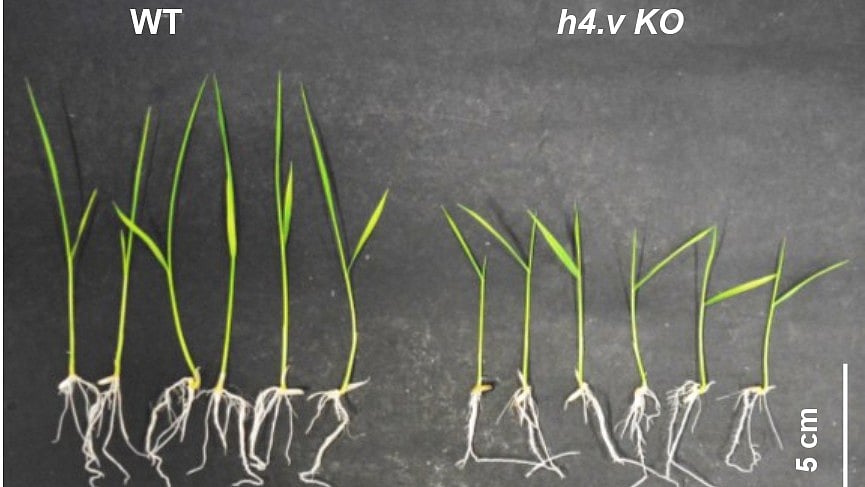
(L) Rice sapling with H4.V showing healthy growth. (R) Rice sapling without H4.V showing stunted growth.
Credit: Vivek Hari-Sundar Gandhivel
Bengaluru: A team of scientists, led by graduate student Vivek Hari-Sundar Gandhivel and Prof PV Shivaprasad at the National Centre for Biological Sciences (NCBS), Bengaluru, has made a breakthrough that could pave the way for more salt-tolerant rice crops — a crucial development as rising soil salinity threatens food production worldwide.
The study, published in the journal Nature Plants, identified a unique variant of a histone protein in rice that helps activate genes involved in responding to salt stress.
Histones are proteins around which DNA wraps, playing a critical role in regulating which genes are turned on or off.
The research focused on a version of one such protein, histone H4. While histone H4 is highly conserved across species, the scientists discovered a rice-specific variant, dubbed H4.V.
What makes H4.V special is a small structural difference compared to the conventional version — but this minor change has a major impact. It facilitates the acetylation of conventional histone H4, a chemical modification that promotes gene activation.
Acetylation helps loosen the DNA packaging, making genes more accessible for expression.
To test the importance of H4.V, the team used genetically modified rice lines lacking the variant and compared them with lines that contained it.
The results were striking — plants without H4.V showed smaller seeds, stunted growth, poor activation of stress-related genes, and greater sensitivity to salt. In contrast, plants with H4.V exhibited more acetylation, increased gene activity, and improved salt tolerance.
With climate change and unsustainable farming practices exacerbating soil salinity in many regions, developing salt-tolerant rice varieties is becoming increasingly vital.
Shivaprasad noted that the study could enable the development of such varieties through breeding or genetic techniques, contributing to global food security.
Alongside Gandhivel and Shivaprasad, other contributors from NCBS included Steffi Raju, Shaileshanand Jha, Chitthavalli Y Harshith, and Kutti R Vinothkumar. Scientists from Austrian institutions — the Gregor Mendel Institute of Molecular Plant Biology and the University of Vienna — also collaborated in this research.